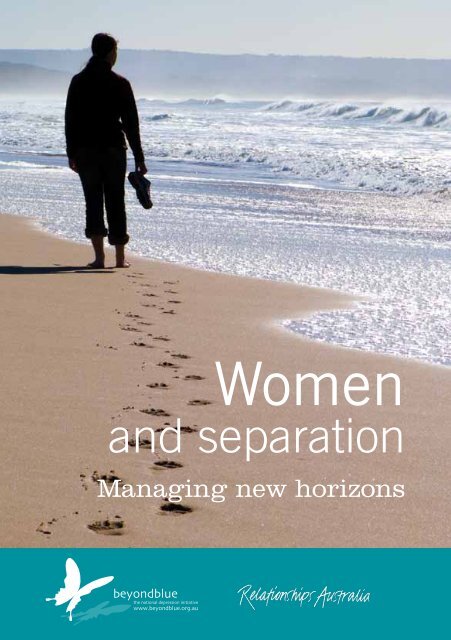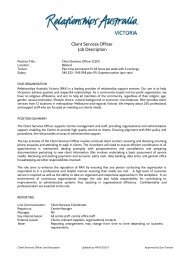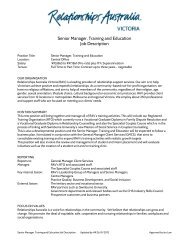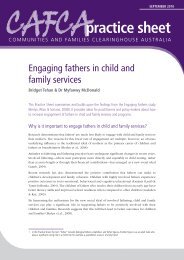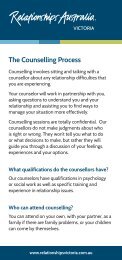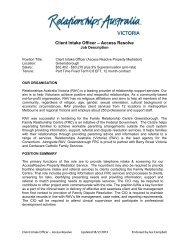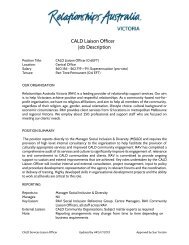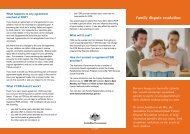Women and Separation (Booklet) - Relationships Australia
Women and Separation (Booklet) - Relationships Australia
Women and Separation (Booklet) - Relationships Australia
You also want an ePaper? Increase the reach of your titles
YUMPU automatically turns print PDFs into web optimized ePapers that Google loves.
AuthorsMargot Rogers, Rosalie Pattenden, Julia Pullen, Andrew BickerdikeAdditional content for the third edition from:• <strong>Relationships</strong> <strong>Australia</strong> (Victoria)• beyondblue: the national depression initiativeAdditional writing, editing, graphics <strong>and</strong> production by Helpful PartnersPty Ltd.AcknowledgementsThe authors would like to thank:• the authors of Men <strong>and</strong> <strong>Separation</strong>, Navigating the Future• colleagues, clients <strong>and</strong>for their contributions.The authors would like to thank colleagues, clients <strong>and</strong> the providers<strong>and</strong> users of women’s services as well as contributing Governmentdepartments.First edition, printed November 2005Second edition, printed September 2007Third edition, printed October 2010© <strong>Relationships</strong> <strong>Australia</strong> (Victoria) <strong>and</strong> beyondblue: the nationaldepression initiative.This work is copyright. You may download, display, print <strong>and</strong>reproduce this material in unaltered form only (retaining thisnotice) for your personal, non-commercial use or use within yourorganisation. All rights are reserved. Requests <strong>and</strong> enquiriesconcerning reproduction rights should be addressed to either of thefollowing:Chief Executive OfficerCommunications Team<strong>Relationships</strong> <strong>Australia</strong> (Victoria) beyondblue: the nationalP.O. Box 180depression initiative2 Prospect Hill Road PO Box 6100Camberwell VIC 3124Hawthorn WestPh: (03) 8573 2222 VIC 3122Fax: (03) 9822 4584 Ph: (03) 9810 6100Email: reception@rav.org.au Email bb@beyondblue.org.au
About this bookIf you are a woman going through separation or divorce, this book isfor you.It was written to:• help you make sense of your feelings• provide options that may be useful• raise your awareness of some services that may help.The book was developed by <strong>Relationships</strong> <strong>Australia</strong> <strong>and</strong> beyondblue:the national depression initiative.<strong>Relationships</strong> <strong>Australia</strong> has extensive experience working with women.• We listen to women both on the phone <strong>and</strong> face-to-face.• We facilitate women’s groups.• We are familiar with research findings which can help explain theprocess of separation.beyondblue provides:• information for women about depression, anxiety <strong>and</strong> relateddisorders• referrals for women to health professionals through its informationline, website <strong>and</strong> information materials.<strong>Separation</strong> presents many challenges for women. We would like tothank the women whose experiences <strong>and</strong> advice contributed to thisbook.This book was not written to advocate separation or divorce, nor do wewish to diminish the distress that many people experience. <strong>Separation</strong>is an extremely difficult time for all concerned.How to use this bookThis is a book to be read <strong>and</strong> re-read. When you re-read it, considerhow your feelings may have changed since the last time.‘Follow the path to healing even though you don’tbelieve you will heal.’B.G., aged 37, three years after separationYou will get through separation <strong>and</strong> life will get better.
Contents<strong>Separation</strong> <strong>and</strong> women's experiences 3The separation 10Looking after yourself 15Children <strong>and</strong> separation 19Relating to your former partner 23Making formal arrangements 26The future 34Research about women <strong>and</strong> separation 35Where to get further assistance 37Suggested reading 43References 45
<strong>Separation</strong> <strong>and</strong>women’s experiences<strong>Separation</strong> <strong>and</strong> divorce are among the toughest experiences you willever have.<strong>Women</strong> report a range of intense feelings at various stages ofseparation, including feeling:• scared about the responsibility for the economic future ofthemselves <strong>and</strong> the children• sad about the break-up of the family unit• nervous about how they will juggle work <strong>and</strong> home commitments• resentful about career sacrifices they may have made in their role ofhomemaker• hateful towards their former partner• bitter about their new circumstances• worried about dealing with bureaucracies <strong>and</strong> the legal system• fearful of making the same mistakes in another relationship• concerned that the relationship with the former partner may remainin conflict• relief that things are out in the open.These responses, many painful <strong>and</strong> distressing, are perfectly normal.You probably have other feelings you can add to the list.The good news is that most women face these intense feelings <strong>and</strong> goon to live fulfilling <strong>and</strong> happy lives. The not-so-good news is that ittakes time.‘<strong>Separation</strong> provides the opportunity for personalgrowth, but you don’t have to go it alone.’F.L., aged 48, three years after separation3
<strong>Women</strong> <strong>and</strong> <strong>Separation</strong> Managing New Horizons<strong>Separation</strong> <strong>and</strong> grief‘It's the simple things that still take me by surprise.Like when I see his car parked somewhere, it allcomes flooding back again.’F.L., aged 48, three years after separationYou may already know what it feels like to grieve the death of a closefriend or relative. It has been suggested that separation or divorceis like this, but some women report that separation is even harder tomanage.<strong>Separation</strong> is complex <strong>and</strong> can involve the loss of:• the family structure <strong>and</strong> routines you’ve been used to• daily contact with your children• the family home• friends <strong>and</strong> social life• support <strong>and</strong> approval from your family <strong>and</strong> community• meaning <strong>and</strong> identity• the opportunity to have children• financial security.These losses are particularly difficult if you:• didn’t want the separation• are still unrealistically hoping for reconciliation• feel betrayed by your former partner• do not have a support network or are ostracised by your friends<strong>and</strong>/or other people in the community• fear a future of living alone.In addition, separation may mean:• practical issues become more difficult, e.g. full time responsibilityfor the children• changes in the nature of some of your adult relationships.<strong>Separation</strong> is extremely difficult <strong>and</strong> you can expect to experienceintense emotions as well as sometimes thinking that you are notcoping.4
<strong>Separation</strong> <strong>and</strong> women's experiences<strong>Women</strong>’s grievingThe path through separation is unlikely to be a neat straight line. Youwill find yourself experiencing the highs <strong>and</strong> lows that come with grief<strong>and</strong> loss including anger, numbness <strong>and</strong> despair.The emotional impact will test your strength <strong>and</strong> your capacity to lookafter yourself properly.Be prepared for ‘triggers’ that may set off the feelings <strong>and</strong> memoriesall over again.How should you be feeling?There are no rules about how you should be feeling. We all progressthrough the separation process at different rates. The trick is not togive yourself a hard time or use unhealthy ways of coping.Don’t let anyone tell you how you should feel. Identify what helps you.You may choose to:• divert feelings into normal routines (work, hobbies, clubs)• let off steam by exercising• express feelings in humour• develop strategies for dealing with practical concerns• join a group with others going through the same experience.‘At first I felt paralysed. I managedto get up every morning <strong>and</strong> getthrough the day, but now I amstarting to feel alive again.’R.M., aged 55,two years after separation5
<strong>Women</strong> <strong>and</strong> <strong>Separation</strong> Managing New Horizons<strong>Separation</strong> <strong>and</strong> depression<strong>Women</strong> who are separated are more likely than others to experiencemental health problems, including depression. Everyone feels sad,unhappy or down once in a while, but clinical depression is different.Depression is more than just a low mood – it’s a serious illness. Peoplewith depression find it hard to function every day <strong>and</strong> do not enjoyactivities that they used to enjoy. Depression has serious effects onboth physical <strong>and</strong> mental health.Are you depressed?You may be experiencing depression if, for more than two weeks, youhave felt sad, down or miserable most of the time or lost pleasure inmost of your usual activities.Common behaviours, thoughts, feelings <strong>and</strong> physical symptomsassociated with depression include:• no longer going out• not getting things done at work• withdrawing from close family members <strong>and</strong> friends• relying on alcohol <strong>and</strong> sedatives or other drugs• inability to concentrate• thoughts such as: ‘I’m a failure.’ ‘Life’s not worth living.’• feeling overwhelmed, guilty or irritable• feeling frustrated, unhappy or indecisive• tiredness, headaches <strong>and</strong> muscle pain• sleep problems• loss or change of appetite• feeling sick <strong>and</strong> run down• significant weight loss or gain.Everyone experiences some or all of these symptoms from time to time,but when symptoms occur together <strong>and</strong> are severe or lasting, it’s timeto seek professional help.6
<strong>Separation</strong> <strong>and</strong> women's experiencesWhat to do if you think you’re depressedIt’s important to seek help as soon as possible. Many women feelembarrassed or feel that they’re letting the family down if they admitto being depressed. However, women should remember that depressionis common <strong>and</strong> treatable.A General Practitioner (GP) is a good person to discuss your concernswith in the first instance. A GP or other health professional will be ableto help you decide whether treatment is needed <strong>and</strong> what treatmentsare suitable. Different types of depression require different types oftreatment <strong>and</strong> support. This may range from physical exercise forpreventing <strong>and</strong> treating mild depression, through to psychologicaltreatments <strong>and</strong> drug treatments for more severe depression.If you don’t have a regular GP or clinic, you can contact beyondbluefor a list of GPs with expertise in treating common mental healthproblems – visit www.beyondblue.org.au <strong>and</strong> click on ‘Find a Doctoror other Mental Health Practitioner’ or call the beyondblue info lineon 1300 22 4636 (local call cost from a l<strong>and</strong>line).Remember:• help is available• with the right treatment, most people recover from depression• don’t dismiss the signs <strong>and</strong> symptoms of mental health problems inyourself because you are too busy caring for others• seek help early – the sooner the better.‘Once I realised I was depressed,getting the right treatment helpedme adjust to the loss of myrelationship.’T.L., aged 38, one year after separation7
<strong>Women</strong> <strong>and</strong> <strong>Separation</strong> Managing New HorizonsChoices you can makeKnowing you have choices allows you to assert some control over yourlife.You may not be able to see choices easily when you are overwhelmed byintense feelings, but options do exist. In time, you will begin to noticethe choices that are available.Some of the important choices other women have made during <strong>and</strong>after separation may help you.You can choose to:• accept that it is over <strong>and</strong> plan for the future• survive – one day at a time• learn new skills or polish up your old skills• seek help• be there for your children• not be the victim• not be hooked into fighting• not be the one who drives an unnecessary legal battle• recover <strong>and</strong> rebuild your life.Try to be a reasonable woman in an unreasonable situation.Counselling – talking to someoneCounselling can help you clarify your thoughts <strong>and</strong> assist you todevelop new strategies. It’s OK to ask for help. Most women who seekcounselling say that they found it helpful <strong>and</strong> wish they’d done itsooner!<strong>Relationships</strong> <strong>Australia</strong>: 1300 364 277Family Relationship Advice Line: 1800 050 321Family <strong>Relationships</strong> Online: www.familyrelationships.gov.au8
<strong>Separation</strong> <strong>and</strong> women's experiencesYour changing roleFor some women, practical matters <strong>and</strong> economic planning weretaken care of by their former partners. If this was the case for you,don’t despair. Learning to do these things yourself can help you feelindependent <strong>and</strong> more confident about the future.Information <strong>and</strong> support services are included on pages 37-42 in thisbooklet.‘Face each day as it happens, deal with each fearas it comes up.’A.G., aged 35, one year after separation9
The separationWho initiated the separation?Of the 47,209 registered divorces in <strong>Australia</strong> in 2008, almost 40%were initiated by women. 1Initiators of divorcesWife 37.3%Husb<strong>and</strong> 27.5%Joint agreement 35.2%If you were the initiator, you may have already gone through theemotional 'roller coaster' of distress (see page 11) <strong>and</strong> be ready to moveon. It may seem that your former partner has fallen into a hole <strong>and</strong> isunable to move on. You may feel:• you are more in control of the situation• guilty about the break-up• worried about the effect on the children• anxious about the financial implications• fearful of your partner• fearful for your partner.If you were not the initiator, you may be struggling while your formerpartner seems to be coping much better. You may feel:• powerless about your social <strong>and</strong> economic future• betrayed, as if something has been taken awayfrom you through no fault of your own• shocked or confused• desperate to be given another chance.‘I am the one who left <strong>and</strong>I hurt as much for him as Idid for myself.’J.H., aged 49, seven monthsafter separation10
The separationDifferences between the initiator <strong>and</strong> the non-initiatorBoth the initiator <strong>and</strong> non-initiator have intense feelings, but they mayhave them at different times, either before or after the separation.In the diagram, you can see that the initiator has the most distressbefore separation, the non-initiator has the most distress afterseparation. You may feel you’re on an emotional roller coaster.BeforeAfterInitiatorDistressDistressTimeNon-initiator‘I thought the ride would never end.’J.K., aged 27, two years after separation11
<strong>Women</strong> <strong>and</strong> <strong>Separation</strong> Managing New HorizonsMixed messagesSome women find it hard to underst<strong>and</strong> why their former partner doesnot accept that the relationship is over despite the fact that they havemade this clear. On the other h<strong>and</strong>, some women find it hard to letgo <strong>and</strong> accept that a relationship has ended. They hope their formerpartner will change his or her mind. They may misread the signals<strong>and</strong> express an inappropriate level of intimacy.Once one person begins to misread the signals, it can set off a chain ofmisunderst<strong>and</strong>ings which ends in arguments <strong>and</strong> distress. You maybe able to recognise yourself <strong>and</strong> your former partner in the chain ofevents in this diagram.InitiatorNon-initiatorFeels guiltyIs friendlyFeels hopefulFeels misunderstoodSuggests reunitingor acts as if in arelationshipRejects angrilyFeels rejected or ashamed(again)12
The separationLooking after yourself‘I started taking care with my appearance, going out <strong>and</strong> exercising.’M.G., aged 40, two years after separationIdeas that have helped other women• Underst<strong>and</strong> that you need time to deal with separation.• Be honest with yourself <strong>and</strong> take responsibility for your life.• Be clear about where you have choices <strong>and</strong> where you don’t.• Ask for help to deal with guilt, self-pity, hopelessness or feelings ofrevenge.• Don’t blame yourself or others.• Commit to looking after yourself – continue to do the things youenjoy.• Don’t use your children as your sounding board.Strategies that have worked for other women• Talk to people about how things are for you.• Seek help for things that you don’t know much about such asfinancial counselling or home maintenance.• Be open to trying different ways of approaching things to find outwhat works for you.Maintain your health <strong>and</strong> wellbeing• Accept help, support <strong>and</strong> encouragement from family members <strong>and</strong>friends.• Reduce isolation by becoming involved in social activities.• Eat healthily <strong>and</strong> include a wide variety of nutritious foods.• Exercise regularly.• Achieve <strong>and</strong> maintain a healthy weight.• Get enough sleep.• Limit alcohol intake.• Allow yourself time to relax <strong>and</strong> reduce your stress.• Keep a check on your physical health.• Watch for signs of stress or depression (for more information seepages 6-7).15
<strong>Women</strong> <strong>and</strong> <strong>Separation</strong> Managing New HorizonsAsk for helpMany women find it difficult to ask for help. They may feel stretchedmeeting children's needs, or may think that counselling is only forpeople who have a diagnosed mental illness.Support is available from:• friends <strong>and</strong> family members• work colleagues <strong>and</strong> employee assistance programs• your local doctor or health centre• your community centre or counselling service• parenting or separation groups• Family <strong>Relationships</strong> Centres• Family Relationship Advice Line (see page 38).If you need help with babysitting, don’t be afraid to ask.Stay in touch with friendsMaintaining your socialnetworks may not be so easynow that you have separated,but they are still importantfor support <strong>and</strong> futurerelationships. Make the effort,even if you feel you don't havethe time.Withdrawing socially may leaveyou feeling more isolated <strong>and</strong>alone. It is important to keepin touch with your existingfriends, <strong>and</strong> also think aboutmaking some new connectionswith others in similarsituations.‘I knew that some of my old friendswere only trying to help, but saying ‘youare better off without him’ or ‘there areplenty of fish in the sea’, didn’t make mefeel any better.’J.L., aged 57, five years after separation16
<strong>Women</strong> <strong>and</strong> <strong>Separation</strong> Managing New HorizonsChild supportThe Child Support Agency (CSA) provides support <strong>and</strong> assistanceto parents, including calculating, collecting <strong>and</strong> transferring childsupport payments.Several factors are taken into account in calculating child support,including:• each parent’s gross annual income (this is calculated according tothe CSA’s formula <strong>and</strong> includes taxable income <strong>and</strong> supplementaryincome <strong>and</strong> fringe benefits tax)• the number of children you have <strong>and</strong> their ages• how many nights per year they spend with each parent.The CSA has online calculators to help you work out the level of childsupport in your case. You can find these at www.csa.gov.auThe CSA also offers products, services <strong>and</strong> referrals to assist parentswith other aspects of their separation.They also collect <strong>and</strong> enforce Court orders.Organising your own paymentsIf you <strong>and</strong> your former partner can agree on the amount, you maybe able to organise direct payments without CSA doing this on yourbehalf. This means drawing up an agreement, usually with the helpof legal advice. Call CSA on 13 12 72 or visit www.csa.gov.au forinformation on all aspects of child support.If you are in dispute over child support your legal aid office may beable to offer advice (see page 42).Returning to the workforceIf you have not worked for a period of time prior to separation, youmay find it daunting to get back into the workforce. Talking to acareers counsellor or a job network provider is a good way to start.You may also like to consider volunteer work to help prepare for areturn to paid work.Centrelink www.centrelink.gov.au or 13 28 50 can refer you to theappropriate services. Also contact Job Services <strong>Australia</strong> at:www.deewr.gov.au/Employment/JSA/Pages/default.aspx18
<strong>Women</strong> <strong>and</strong> <strong>Separation</strong> Managing New HorizonsParenting arrangementsThe law presumes that it is in the best interests of a child for parentsto have equal, shared parental responsibility. This means that bothparents have an equal role in making decisions about major long-termissues such as schooling <strong>and</strong> healthcare. This does not automaticallymean that your child will spend equal time with each parent. If thematter goes to Court, the Court will consider what is in the child’s bestinterests.Living arrangementsResearch has shown that sharing parenting time equally can work inappropriate circumstances, but may not be appropriate if:• there is high conflict• parents live a long distance apart• there is violence, or drug <strong>and</strong> alcohol issues.Ensure that the new arrangements are safe. You might want totake into account the relationships that your children have withother significant people, such as gr<strong>and</strong>parents <strong>and</strong> extended familymembers.It is important that living arrangements reflect the needs <strong>and</strong> ages ofthe children, the capacity of both parents to care for them <strong>and</strong> how thefamily worked before separation. Children can:• spend equal time with both parents• spend substantial <strong>and</strong> significant time with both parents.Parents are encouraged to set out arrangements in a signed parentingplan (see page 31).20
Children <strong>and</strong> separationAlways a parent<strong>Separation</strong> should not mean the end of a relationship with yourchildren for you or your former partner. The family will continue, butin a different form. Your children may have two homes.New rituals <strong>and</strong> routines will be established. If you were the primarycarer before the separation, you may now spend some time away fromyour children. This can be rewarding once you have adjusted to thesituation.Contact with both parents is important for stable <strong>and</strong> happy childrenso, where it is safe to do so, encourage your children to remaininvolved with their other parent.60% of children say they:• like the loving <strong>and</strong> caring of each parent• like the positive personal characteristics of each parent• would like more contact with the parent they see less. 2Any changes are difficult for children, so keep change to a minimum<strong>and</strong> involve them as much as possible. While you can’t prevent change,you can assist them to cope with it. Children will adapt if they aregiven structure <strong>and</strong> stability.Different doesn’t have to be worse.Absent parentsSometimes the other parent is totally absent. Maintaining a positiveimage of the other parent in a child’s mind can be very difficult, but itis still important.For books with useful advice on parenting, see Suggested Reading,page 43.21
<strong>Women</strong> <strong>and</strong> <strong>Separation</strong> Managing New HorizonsBeing there for your childrenBeing there for your children is very important. Keep importantroutines, <strong>and</strong> develop new ones together. The challenge is to find timeto do it all without falling in a heap. It may be difficult at first becauseof all that is happening in your life.Inform the school of the changes <strong>and</strong> stay involved with the children'sactivities <strong>and</strong> their friends.• Don’t expect your children to look after you emotionally (you are theparent).• Don’t talk negatively about your former partner to the children.• Don’t ask your children to play 'messenger' between parents.• Don’t quiz your children about the other parent <strong>and</strong> what he/she isdoing.• Be alert to any signs of distress including physical illnesses orchanges in behaviour.• Encourage your children to attend counselling if they need to talkto someone outside the family.Even adult children may experience intense emotions at this time.Kids Helpline provides free confidential telephone <strong>and</strong> onlinecounselling for children <strong>and</strong> young people aged between five <strong>and</strong> 25.Call 1800 55 1800 or visit www.kidshelp.com.auThe Child Support Agency has a booklet <strong>and</strong> website for teenagerswhose parents are separating or have separated.More at www.youth.csa.gov.auConsider getting help withyour parentingThere are many good courses <strong>and</strong> books thatcan assist you with your changed parentingrole (see page 43).You can also seek advice from <strong>Relationships</strong><strong>Australia</strong>, Family Relationship Centres orthe Family Relationship Advice line (seepages 37-42).Gr<strong>and</strong>parents may also be available toprovide support <strong>and</strong> assistance withparenting.22
Relating to your former partnerSome people believe when they separate, they will no longer have todeal with their former partner. However, if you have children this isnot possible – you remain linked as parents.The challenge is to make the ongoing parenting relationship asmanageable <strong>and</strong> constructive as possible.Be civil to your former partner, irrespective of how he/she approachesyou, but never compromise safety.Constructive co-parenting involves establishing a business-likerelationship with your former partner. Below are some practical tips toassist you.• Focus on the children, not the pastrelationship.• Hold meetings at a neutral location ifpossible.• Use the telephone, email or acommunication book if face-to-facediscussion is a problem.• Consider legal advice, family disputeresolution or counselling if you havedifficulties.• Be flexible – children have commitments<strong>and</strong> special occasions will arise.• Consider special days in advance, such asChristmas <strong>and</strong> children’s birthdays.• Do not breach or allow any breach of aCourt order that prohibits contact withyour former partner.23
<strong>Women</strong> <strong>and</strong> <strong>Separation</strong> Managing New HorizonsWhat if there isn’t a good working relationship?In some situations, a business-like interaction may not be possible.Some parents, for a variety of reasons, are not supportive of thechildren's relationship with the other parent. In these situations, theother parent can feel distressed, powerless <strong>and</strong> angry <strong>and</strong> may feel his/her children are being denied the right to a relationship with him/her.If you are in such a situation:• do not use the children as a way of getting even• view your conflict 'through the eyes of the children'• consider family dispute resolution with your former partner <strong>and</strong>focus on practical issues• examine your own behaviour <strong>and</strong> what you can do to help thesituation, such as speaking with a counsellor• debrief with friends or family members• consider legal advice <strong>and</strong> action• remain realistic• use family relationship services <strong>and</strong> children's contact services.No matter how hostile the situation, many women find strength inmaintaining their position <strong>and</strong> dignity.• Stop any negotiation if the discussion becomes abusive.• Stay away from your former partner if either of you is affected byalcohol or other drugs.You must obtain legal advice if you are not going to comply with acourt order.24
Making formal arrangementsParenting arrangements are decided in the ‘child's best interests'.Property division is based on several factors including direct <strong>and</strong>indirect financial <strong>and</strong> non-financial contributions <strong>and</strong> future needs.Recent legislation has given separating de facto couples <strong>and</strong> thosein same sex relationships similar property entitlements to marriedcouples. 4AgreeingThe best outcomes generally occur where couples negotiate their ownmutually-acceptable agreements about:• property settlement – how your cash <strong>and</strong> assets includingsuperannuation will be split up• parenting arrangements – who the child will live with <strong>and</strong> howmuch time a child will spend with each parent• child support payments – who will pay how much to assist withchild-related costs.You may need to use lawyers or family dispute resolution (see pages37-42) to help with agreements, arrangements or parenting plans.These may need to be formalised by a Court.Some couples are unable or unwilling to reach agreement in this way.Arrangements may have to be decided by a judge, <strong>and</strong> it may add tothe confusion, stress <strong>and</strong> powerlessness you already feel.In the Family Court:• 9.2% of Court applicants go to trial 5• 31% involve Court applications, but do not go to trial 5• 60% are sorted out with the help of family dispute resolution,lawyers <strong>and</strong> counselling out of court 5• 51% involve children. 5Approximately 50% of disputes settled by community-basedorganisations are resolved by mediation. 626
Making formal arrangementsDo your legal homeworkBecause of the legal issues involved, particularly in property <strong>and</strong>finance matters, it is wise to get legal advice.Legal advice is not the same as a court battle. It should provide soundinformation <strong>and</strong> options for settlement that need not involve legalaction. Many lawyers experienced in family law will give you an initialfree or reduced-rate consultation <strong>and</strong> negotiate on your behalf aboutproperty, finance <strong>and</strong> the children. Check to see if you are eligible forLegal Aid.Contact:• your state Law Society or Law Institute for family law specialists• the Family <strong>Relationships</strong> Advice Line on 1800 050 321• the Family Law Courts website www.familylawcourts.gov.au• your nearest Community Legal Centre at www.naclc.org.au or<strong>Women</strong>'s Legal Service• a Legal Aid office in your state or territory.For more information see www.familyseparation.humanservices.gov.au<strong>and</strong> Where to get further assistance (pages 37-42).Lawyers cost money – do your research first• Think about the information your lawyer will need.• Prepare some written questions.• Seek help/advice to underst<strong>and</strong> the system.When you visit your lawyer, ask:• a friend to take notes• for an estimate of costs at each stage• for the likely outcomes.If you are dissatisfied with the adviceyou get, seek a second opinion.Read: A Fair Share, Negotiating yourproperty settlement. See SuggestedReading (page 43).‘Going to a lawyer early inthe Family Dispute Resolutionprocess helped me underst<strong>and</strong>my legal rights aroundproperty. It was like making acareful business decision formyself.’B.S., aged 32, one year afterseparation27
<strong>Women</strong> <strong>and</strong> <strong>Separation</strong> Managing New HorizonsNegotiation methodsNegotiation is hard work, but if you don't attempt it, you may findthat:• parenting arrangements don't work for you• child support payments don't reflect your former partner's incomeaccurately• you face expensive legal processes• you feel exploited or resentful.Sometimes, it’s impossible to discuss things directly with your formerpartner. Family dispute resolution can assist you to make decisionsabout your relationship <strong>and</strong> develop a workable plan for the future.This can include sorting out assets <strong>and</strong> financial matters, as wellas future parenting responsibilities through the preparation of aparenting plan (see page 31).28
Making formal arrangementsFamily dispute resolutionFamily dispute resolution (also referred to as FDR) can assist you<strong>and</strong> your former partner to make decisions about your children, yourrelationship <strong>and</strong> future plans without going to Court.Family dispute resolution practitioners do not take sides. They do notrepresent either party or provide financial or legal advice. Their role isto help you <strong>and</strong> your former partner reach agreement. This can assistyou to:• make your own decisions• reduce the financial <strong>and</strong> emotional costs of legal proceedings• improve your working relationship as parents• improve your communication with your former partner• resolve future disputes.Family dispute resolution with a registered practitioner is arequirement before you can apply to the Court for a Parenting Order(for further information see page 31). There are some exceptions tothis, such as cases involving family violence or child abuse or wherethe matter is urgent.Family Relationship Centres, <strong>Relationships</strong> <strong>Australia</strong>, private familydispute resolution practitioners <strong>and</strong> some lawyers offer family disputeresolution. Contact them for more information, including fees (seepages 37-42).Visit www.fdrregister.familyrelationships.gov.au to find a list ofregistered family dispute resolution practitioners <strong>and</strong> their locations,or call the Family Relationship Advice Line on 1800 050 321 or visitwww.familyrelationships.gov.auIntimidationIf your former partner is intimidating you, family dispute resolutionmay not be appropriate. Tell your family dispute resolutionpractitioner. Your lawyer can negotiate on your behalf.29
<strong>Women</strong> <strong>and</strong> <strong>Separation</strong> Managing New HorizonsDon't give away too much too soon• Don’t commit to an agreement immediately after separating just toget it over <strong>and</strong> done with.• Don’t sell yourself short – or go for too much.• Be clear <strong>and</strong> realistic about what you want.• Get legal advice before signing any document.Formalising property arrangementsUsing a lawyerProceedings for the division of property must start within twelvemonths of the divorce order becoming final.It’s wise to seek legal advice prior to negotiating any agreement withyour former partner about property. This way, you know what yourrights are.If you can then reach agreement about the property split, you caninstruct your lawyer to prepare formal ‘consent orders’ for the Court.These are formalised <strong>and</strong> become ‘court orders’ which are binding.Your lawyer can usually do this without the need for you to attendCourt personally.Preparing your own consent ordersIf you don’t want to use a lawyer, you can file consent orders on yourown behalf.Applications must be in the required form, explaining how the assets<strong>and</strong> debts will be divided between you <strong>and</strong> your former partner. Afteryou have both signed, the orders are processed by the Court <strong>and</strong> arelegally binding. You may need to provide further written informationif the Court is not satisfied with either the information or the assetdivision.Consent orders for property are necessary, otherwise your formerpartner may ask to change your property settlement in the future.If you’re unable to come to an agreement over property, your lawyerwill negotiate on your behalf with your former partner’s lawyer. Thismay involve going to Court, which can be costly <strong>and</strong> take some time(see page 32).Read A Fair Share, Negotiating your property settlement. SeeSuggested Reading, (pages 43-44).30
Making formal arrangementsFormalising parenting arrangementsThere are two ways of formalising your arrangements:1. Parenting Order (an order, filed in Court)While Court orders for property are final, parenting orders are not, aschildren’s needs may change over time.It’s best if parenting orders are flexible <strong>and</strong> contain general agreementsabout the children’s care. However, if there is a high level of conflict inyour relationship, you may need to obtain orders with more detailedarrangements. You will then have to apply to the Court for new orderseach time your children’s needs change.2. Parenting plan (an agreement, not filed in Court)Family law reforms from July 2006 encourage parents to set outarrangements in a signed parenting plan.The plan may cover:• who the child lives with• the amount of time the child spends with each parent• how parents share the parenting responsibility• financial maintenance of the child• length of time for which the plan is valid.Plans can be changed easily according to changing needs <strong>and</strong> yourcircumstances, but any changes must be mutually agreed.Parenting plans are not legally enforceable. However, if you have togo to Court at a later date, the Court may consider the terms of themost recent parenting plan <strong>and</strong> the extent to which both parents havecomplied.Family dispute resolution (see page 29) assists separating couples tomake decisions <strong>and</strong> to develop parenting plans without going to Court.‘Family dispute resolution enabled us to work out aparenting plan <strong>and</strong> from then on, things seemed tosettle down.’M.R., two years after separation31
Making formal arrangementsDealing with institutions‘When seeking assistance from government agencies, I always took my knitting<strong>and</strong> my lunch.’(L.C., aged 45, six years after separation)Remember that all institutions are acting according to legislation, nottrying to make things difficult for you.• Be courteous <strong>and</strong> respectful with the employees of institutions youdeal with – this often results in helpful responses.• Ask questions if you don't underst<strong>and</strong> – underst<strong>and</strong>ing newinformation is especially difficult if you’re under stress.• Avoid blame or recriminations either towards your former partneror 'the system'.• If the service is unsatisfactory, speak to a supervisor or use thecustomer complaints procedure.• Gather all relevant information before you act or make decisions.• Seek advice from the Family <strong>Relationships</strong> Advice Line(1800 050 321) or your lawyer.• Talk about family dispute resolution with <strong>Relationships</strong> <strong>Australia</strong>(1300 364 277) or your lawyer.RememberThe more you can agree on withyour former partner, the more youwill minimise your engagementwith 'the system'. However, donot jeopardise your personalsafety or that of your children,or be pressured into making anagreement that you think isunfair.33
The futureMany women report positive <strong>and</strong> healthy changes in their lives <strong>and</strong>discover aspects of themselves that they never knew existed.They recognise that life changes <strong>and</strong> many talk of finding innerstrengths, new friends <strong>and</strong> new resources.New relationships <strong>and</strong> moving onClose relationships are important to everyone. Often, after separation,there is a great need to reconnect <strong>and</strong> to feel wanted <strong>and</strong> cared for oncemore.Some women shy away from starting another relationship <strong>and</strong> findit hard to trust again. Others move straight into a new relationshipwhich may ease the pain initially. While this can often be a healingexperience, it may not allow sufficient time for you to work throughpast issues.Whatever occurs for you, take it slowly.• Give yourself time to grieve the loss of the relationship.• Take time to re-establish your own identity.• Look after yourself.Some women join interest groups <strong>and</strong> enjoy companionship, butremain unattached. Some establish a committed relationship thatincludes children from other relationships.Choose wisely <strong>and</strong> find out what works for you.Read Partners – A Guide to Successful <strong>Relationships</strong>. See SuggestedReading (page 44).‘When the clouds finally lifted, I could see thesunshine.’A.S., aged 38, 12 years after separation34
The futureResearch about women<strong>and</strong> separation<strong>Separation</strong> <strong>and</strong> divorce• 29.3 years was the median age for women to marry. 1• 41.4 years was the median age for women to divorce. 1• 61.9% were under 45 years. 1• 8.8 years was the median duration of marriage to separation. 1• 48.8% of divorces involve children aged under 18 years. 1• 6% of divorces involve separation within the first year of marriage. 2• <strong>Women</strong> aged 25-29 experience the highest divorce rates. 1• 43% of marriages will end in divorce. 7<strong>Women</strong> <strong>and</strong> their children after separation• 16% of families are single mother families; 2% of families are singlefather families. 8• 87% of single parent families are headed by the mother. 9• The number of children in a sole parent family is 1.7 (average). 9• 19.2% of separated mothers are in the labour force full-time <strong>and</strong>31.2% part-time. 9• 63% of lone mothers receive a pension or some other form ofgovernment support as their principle source of income. 9• 24.7% of lone mothers own their house with a mortgage, 7.7%without a mortgage <strong>and</strong> 65.1% rent. 9• The disposable income of one-parent families with children under 15was 70% of the disposable income of couple families with children ofthe same age. 9• 78.6% of children aged under eighteen whose parents haveseparated (averaged across all age groups) live with their mothers. 10• 22% of children live in one-parent families. 10• 43% of children aged between 0-17 years with a natural parentliving elsewhere, see this parent at least once per fortnight, whilst28% see this parent less than once a year or never. 8• 15% of adults had separated parents by 18 years of age. 835
<strong>Women</strong> <strong>and</strong> <strong>Separation</strong> Managing New HorizonsImpact of separation <strong>and</strong> divorce on women• <strong>Women</strong> are more likely to experience financial hardship afterdivorce than men. 11• <strong>Separation</strong> <strong>and</strong> divorce are recognised as factors contributing toanxiety <strong>and</strong> depression. 12• One year after separation, the average woman's income drops by42%. 13• 41% of single-parent families receive no child support. 14• 45% of single-parent families receive a government pension, benefitor allowance. 9• 8.1% of single-parent families own their own home (withouta mortgage) compared to 28.8% of couples (with dependentchildren). 15New partners <strong>and</strong> new familiesDifferent families coming together can place a strain on parent-childrelationships.• 80% of men will re-partner within 5 years. 16• 69% of women will re-partner within 5 years. 16• Remarriages following divorce have the highest risk of divorce. 7• 10.6% of children live in step or blended families. 17• 30% of both men <strong>and</strong> women who re-marry have children under 16years of age. 1836
Where to get further assistanceContact any of these national organisations. They can refer you toservices in your area.<strong>Relationships</strong> <strong>Australia</strong><strong>Australia</strong>-wide services for families <strong>and</strong> individuals.1300 364 277www.relationships.com.aubeyondblue: the national depression initiativeInformation on depression, anxiety <strong>and</strong> related disorders, availabletreatments <strong>and</strong> where to get help.beyondblue info line – 1300 22 4636 or infoline@beyondblue.org.au(information <strong>and</strong> referral to a health professional).www.beyondblue.org.au<strong>Australia</strong>n Parenting <strong>and</strong> Relationship HelplineFree telephone counselling, <strong>and</strong> information about parenting,separation <strong>and</strong> other relationship issues.1300 365 859<strong>Australia</strong>n <strong>Women</strong>’s Health NetworkDetails of women’s health services in each state <strong>and</strong> territory.www.awhn.org.auCarers <strong>Australia</strong>Family carer support <strong>and</strong> counselling in each state <strong>and</strong> territory.1800 242 636 (free call from l<strong>and</strong>lines).www.carersaustralia.com.auChild Support AgencyCSA ensures all parents meet their child support responsibilities.Website includes information about legal services, services in yourlocal area, <strong>and</strong> calculators for child support.13 12 72www.csa.gov.au37
<strong>Women</strong> <strong>and</strong> <strong>Separation</strong> Managing New HorizonsCentrelinkEmployment serviceswww.centrelink.gov.auCentrelink & Family Assistance Multilingual Service13 12 02Community Legal Centres – national officeProvides legal assistance to disadvantaged people.www.naclc.org.auDomestic Violence – see Family ViolenceFaHCSIA (Department of Families, Housing, Community Services <strong>and</strong>Indigenous Affairs)1300 653 227www.fahcsia.gov.auFamily Assistance OfficePayments information for people on family assistance.13 61 50www.familyassist.gov.auFamily Court of <strong>Australia</strong> (not WA)1300 352 000Family Court of Western <strong>Australia</strong>(08) 9224 8222Information about the function of the Family Courtwww.familycourt.gov.auFamily Relationship Advice LineThis is a free helpline to assist with Family Law problems for thoseunable to attend a Family <strong>Relationships</strong> Centre. Information aboutoptions <strong>and</strong> location of family services for separating families.1800 050 32138
Where to get further assistanceFamily Law OnlineA Commonwealth website designed to give easy access to the FamilyLaw system resources, including information about relevant services.www.familylaw.gov.auFamily <strong>Relationships</strong> OnlineWebsite with information about the Family Law system – Informationon family relationship issues <strong>and</strong> services available to assist families.www.familyrelationships.gov.auFamily Relationship Services <strong>Australia</strong><strong>Australia</strong>-wide services <strong>and</strong> referrals to over 65 member organisationsfor families <strong>and</strong> individuals.www.frsa.org.auFamily <strong>Separation</strong>: A Guide for TeensA booklet <strong>and</strong> website specifically for young people whose parents haveseparated or are separating.www.youth.csa.gov.auFamily ViolenceAssistance <strong>and</strong> refuge for victims of family violence.www.dvirc.org.auACT Domestic Violence Crisis Service (02) 6280 0900NSW Domestic Violence Line 1800 656 463NT Darwin: Domestic Violence Counselling Service (08) 8945 6200NT Alice Springs: Alice Springs <strong>Women</strong>’s Shelter (08) 8952 6048QLD Domestic Violence Telephone Service 1800 811 811SA Domestic Violence Crisis Service 1300 782 200TAS Domestic Violence Crisis Service 1800 608 122VIC <strong>Women</strong>’s Domestic Violence Crisis Service (03) 9322 3555or 1800 015 188WA <strong>Women</strong>’s Domestic Violence Helpline (08) 9223 1188or 1800 007 33939
<strong>Women</strong> <strong>and</strong> <strong>Separation</strong> Managing New HorizonsNational Domestic Violence <strong>and</strong> Sexual Assault HelplineConfidential 24-hour phone counselling.1800 200 526Financial counsellingFree financial counselling services for people with low incomes or whoare experiencing financial crisis.www.fcrc.org.au includes counsellor directoryConsumer Affairs Victoria 1300 55 81 81Financial Counsellors Association of NSWCredit <strong>and</strong> Debt Helpline 1800 870 488Financial Counsellors Association of WA 1800 889 364Interpreter ServicesAssistance for people who may not underst<strong>and</strong> or speak Englishfluently.13 14 50Jean Hailes Foundation for <strong>Women</strong>’s HealthHealth information, research <strong>and</strong> services for <strong>Australia</strong>n women.www.jeanhailes.org.auKids Help LineNational 24-hour telephone counselling service for the cost of a localcall.1800 55 1800www.kidshelp.com.auLifeline13 11 14LikeitisOnline details of gay <strong>and</strong> lesbian telephone help lines in each state <strong>and</strong>territory.www.likeitis.org.au/sexuality/helplines40
Where to get further assistanceMulticultural Mental Health <strong>Australia</strong>Mental health support for <strong>Australia</strong>ns from culturally-diversebackgrounds.(02) 9840 3333www.mmha.org.auMy family is separating – what now?A website to help families who are experiencing separation to findtheir way around the Family Law system, underst<strong>and</strong> their rights <strong>and</strong>responsibilities following separation <strong>and</strong> find information on availableservices.www.familyseparation.humanservices.gov.auMultilingual Service (Centrelink & Family Assistance)13 12 02Multicultural <strong>and</strong> Indigenous Affairswww.dimia.gov.auParent easy guidesUseful fact sheets for parents on a wide range of topicswww.parenting.sa.gov.au/pegs/Parentline1300 365 859www.parentline.com.auSee ‘Getting Help’ then ‘Who Else Can Help?’ for phone numbers inyour state or territory.ParentlinkInformation, advice <strong>and</strong> contacts for parentswww.parentlink.act.gov.auSuicide Call Back ServiceTelephone support for people at risk of suicide, their carers <strong>and</strong> thosebereaved by suicide.1300 659 46741
<strong>Women</strong> <strong>and</strong> <strong>Separation</strong> Managing New HorizonsYouthbeyondbluebeyondblue’s website for young people – information on depression <strong>and</strong>anxiety <strong>and</strong> how to help a friend.www.youthbeyondblue.com<strong>Women</strong>’s Legal ServicesServices for women requiring legal assistance.<strong>Women</strong>’s Legal Resource Centre NSW (02) 9749 5533<strong>Women</strong>’s Legal Service Victoria (03) 9642 0877 or1800 133 302 (country callers)<strong>Women</strong>’s Legal Service Queensl<strong>and</strong> (07) 3392 0670 or1800 677 278(outside Brisbane area)<strong>Women</strong>’s Legal Service South <strong>Australia</strong> (08) 8221 5553 or1800 816 349<strong>Women</strong>’s Legal of Western <strong>Australia</strong> (08) 9272 8800 or1800 625 122 (Freecall)<strong>Women</strong>’s Legal Services Tasmania 1800 682 468 (Freecall)Top End <strong>Women</strong>’s Legal Services NT (08) 8982 3000 or1800 234 441<strong>Women</strong>’s Legal Centre ACT <strong>and</strong> Region (02) 6257 4499 or1800 634 669Legal Service for Indigenous <strong>Women</strong> 1800 639 78442
Suggested readingThere are many books <strong>and</strong> pamphlets available that can help you withparenting <strong>and</strong> separation. You can download some from websites, orborrow them from a local library, community centre or buy them froma bookshop.beyondblue also have a range of fact sheets <strong>and</strong> information materialson depression, anxiety <strong>and</strong> related disorders, available to downloador order from www.beyondblue.org.au/resources or by calling thebeyondblue info line on 1300 22 4636.A Fair Share, Negotiating your property settlement – <strong>Relationships</strong><strong>Australia</strong>. Call 1300 364 277 for details.Adult Children of Divorce: How to Overcome the Legacy of YourParents’ Breakup <strong>and</strong> Enjoy Love, Trust <strong>and</strong> Intimacy –J. Zimmerman <strong>and</strong> E.S. ThayerCreative Parenting After <strong>Separation</strong>: A Happier Way Forward –E. SeddonGood Parenting Through Your Divorce – M. E. HannibalHappily Ever Parted – B. MarquardtHelping Children Cope with Divorce – E. TeyberMaking Divorce Easier on Your Child: 50 Effective Ways to HelpChildren Adjust – N. Long <strong>and</strong> R. L. Foreh<strong>and</strong>Me <strong>and</strong> my Changing Family – Child Support Agencywww.csa.gov.au or call 13 12 72 for details.Me <strong>and</strong> my Kids – Child Support Agency. Go to www.csa.gov.auor call 13 12 72 for details.Me <strong>and</strong> my Money – Child Support Agency. Go to www.csa.gov.auor call 13 12 72 for details.Men <strong>and</strong> <strong>Separation</strong>: Navigating the Future – <strong>Relationships</strong> <strong>Australia</strong>,Crisis Support Services <strong>and</strong> beyondblue. Call 1300 364 277 for details.Mom’s House, Dad’s House: Making Two Homes for Your Child –I. Ricci43
<strong>Women</strong> <strong>and</strong> <strong>Separation</strong> Managing New HorizonsPartners – A Guide to Successful <strong>Relationships</strong> –<strong>Relationships</strong> <strong>Australia</strong>. Call 1300 364 277 for details.Rebuilding: When Your Relationship Ends – B. Fisher <strong>and</strong> R. E. AlbertiShared Parenting. Raising your children co-operatively afterseparation – J. Burrett <strong>and</strong> M. GreenSurviving your Parents’ Divorce: The Bright Side – M. SindellThe Everything Parents Guide to Children <strong>and</strong> Divorce – C. E. PikhardWhat about the Children? – <strong>Relationships</strong> <strong>Australia</strong>. Call 1300 364 277for details.What about Me? – Child Support Agency. Go to www.csa.gov.au orcall 13 12 72 for details.44
References1. <strong>Australia</strong>n Bureau of Statistics, 2008, Cat. No. 3310.0.2. <strong>Australia</strong>n Bureau of Statistics, 1301.0 – Year Book <strong>Australia</strong>, 2008.3. <strong>Australia</strong>n Bureau of Statistics, <strong>Women</strong>’s Safety in <strong>Australia</strong>, survey, 1996.4. Family Law Amendment (De Facto Financial Matters <strong>and</strong> Other Measures) Act, 20085. Family Court of <strong>Australia</strong> Annual Report 2007-2008.6. Federal Magistrates Court of <strong>Australia</strong>. Annual Report 2007 – 2008. Part 3: The workof the Court in 2007-2008.7. <strong>Australia</strong>n Bureau of Statistics, Research FaCS Sheet Number 6, September 2000, Cat.No. 3310.0.8. <strong>Australia</strong>n Bureau of Statistics, Family characteristics <strong>and</strong> transitions 2006-07, Cat.No. 4442.0.9. <strong>Australia</strong>n Bureau of Statistics, <strong>Australia</strong>n Social Trends 2007, Cat. No. 41020.10. <strong>Australia</strong>n Institute of Family Studies. Childrens living arrangements after parentalseparation. Family Matters 67: Autumn 2004.11. Weston R, Smyth B, Financial living st<strong>and</strong>ards after divorce, <strong>Australia</strong>n Institute ofFamily Studies, Family Matters No. 55, Autumn 2000.12. Mental health promotion plan: foundation document 1999-2002, Victorian Health,1999.13. AMP.NATSEM. Income <strong>and</strong> Wealth Report: Financial Impact of Divorce in <strong>Australia</strong>,Issue 10 April 2005.14. House of Representatives St<strong>and</strong>ing Committee on Family <strong>and</strong> Community Affairs.Every Picture Tells a Story: Inquiry into child custody arrangements in the event offamily separation. December 2003, Canberra.15. <strong>Australia</strong>n Bureau of Statistics, Household Income <strong>and</strong> Income Distribution <strong>Australia</strong>2007-2008, Cat. No. 6523.0.16. Funder, Harrison <strong>and</strong> Weston, Settling Down: Pathways of Parents after Divorce,Monograph 13, <strong>Australia</strong>n Institute of Family Studies, 1993.17. <strong>Australia</strong>n Bureau of Statistics (2007) 2006 Census of population <strong>and</strong> Housing, Cat no2008.0.18. <strong>Australia</strong>n Bureau of Statistics, Marriages, <strong>Australia</strong> 2004, Cat. No. 3306.0.55.001.45
<strong>Relationships</strong> <strong>Australia</strong>1300 364 277www.relationships.com.auwww.relationshipsvictoria.com.au<strong>Relationships</strong> <strong>Australia</strong> Victoria has been providing professional counselling,family dispute resolution, family violence prevention, relationship skillseducation <strong>and</strong> training services to individuals, couples <strong>and</strong> families for over60 years. A network of over 80 offices is spread throughout all <strong>Australia</strong>nstates <strong>and</strong> territories.beyondblue: the national depression initiativebeyondblue: the national depression initiative provides information ondepression, anxiety <strong>and</strong> related disorders, available treatments <strong>and</strong> where toget help. Visit www.beyondblue.org.au or call the beyondblue info line on1300 22 4636.


